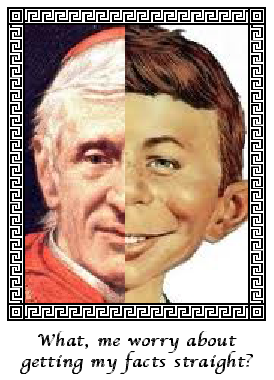
Posted on 10/14/2019 7:58:38 AM PDT by fishtank
John Henry Cardinal Alfred E Newman
First published September 4, 2011; republished in honor of Newman’s canonization as a Roman Catholic saint.
Monday, October 14, 2019
John Henry Cardinal Alfred E Newman Alister McGrath’s Iustitia Dei: A History of the Christian Doctrine of Justification, Third Edition (Cambridge: Cambridge University Press, ©2005), doesn’t end at the Reformation. He continues to review developments in the various doctrines of justification as they proceeded through the Lutheran, Reformed, and Anglican schools of thought.
McGrath writes about the “seriously and irredeemably inaccurate” historical and theological analyses that John Henry Cardinal Newman did of Luther’s doctrine of Justification. That assessment — “seriously and irredeemably inaccurate” — is based on his review of Newman’s 1837 Lectures on Justification.
(Excerpt) Read more at triablogue.blogspot.com ...


Good grief, a parody?!

No parody.
Please read the article.
From it:
“McGrath says of Newman:
Newman’s theology of justification rests primarily upon a historical analysis of the doctrines of justification associated with Luther (and to a much lesser extent, with Melanchthon), with Roman Catholic theologians such as Bellarmine and Vasquez, and with the Caroline Divines.
It is therefore of the utmost importance to appreciate that in every case, and supremely in the case of Luther himself, Newman’s historico-theological analysis appears to be seriously and irredeemably inaccurate.
In other words, Newman’s construction of a via media doctrine of justification seems to rest upon a fallacious interpretation of both the extremes to which he was opposed, as well as of the Caroline divinity of the seventeenth century, which he regarded as a prototype of his own position. (296-297)”
Is this today’s crypto thread?
as I understand it, every single Catholic saint is/was a sinner. They got something wrong at some point in their lives, but lived overwhelmingly, in the big picture, like someone who is a loyal friend of Jesus. There are even some saints who got it wrong on an important theological point, and still “made the cut”, despite their doctrinal error.
So, in the worst case scenario, even if Newman wrote a lousy treatise on something, and I don’t know whether he did or not, consider the whole.
Newman became a Catholic in 1845.
And was created Cardinal in 1879, so your title is really rather misleading.
Cardinal Newman is cited by Russell Kirk as a significant conservative thinker both before and after leaving the Anglican communion.
Fishtank has a blogger that doesn’t like something he wrote over a hundred years ago.
I’ll go with Kirk in my general opinion.
HAHAHAHA!
Disclaimer: Opinions posted on Free Republic are those of the individual posters and do not necessarily represent the opinion of Free Republic or its management. All materials posted herein are protected by copyright law and the exemption for fair use of copyrighted works.